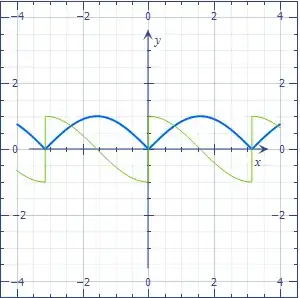Why does $\frac d{dx} \sqrt{1 - \cos^2(x)} = \cos(x)$ when $\sqrt{1 - \cos^2(x)} = |\sin(x)|$? I mean it's not equal to $\sin(x)$? Is this the right way to take the derivative?
Asked
Active
Viewed 80 times
0
-
2Why is the first equality true? – markvs Sep 20 '20 at 18:54
2 Answers
1
Actually,$$\frac{d}{dx}\sqrt{1-\cos^2 x}=\frac{1}{2\sqrt{1-\cos^2 x}}\cdot \frac{d}{dx}(1-\cos^2x)=$$$$=\frac{\cos x \sin x}{|\sin x|}=\frac{\sin (2x)}{2|\sin x|}, \ \ (x \neq k\pi, k\in \mathbb{Z})$$ where the RHS is equal to $\frac{d}{dx}|\sin x|$ according to this answer. Hence, $$\frac{d}{dx}\sqrt{1-\cos^2 x}=\frac{d}{dx}|\sin x|$$ but not $$\frac d{dx} \sqrt{1 - \cos^2(x)} \color{red}{\overset ?=} \frac{d}{dx}\sin x = \cos(x)$$ as you claim.
VIVID
- 11,604
-
$$\frac{d}{dx}\sqrt{1-\cos^2 x}=\frac{\cos x \sin x}{|\sin x|}$$ — Could you please include steps which prove this? – Cognoscenti Sep 20 '20 at 19:16
-
1
